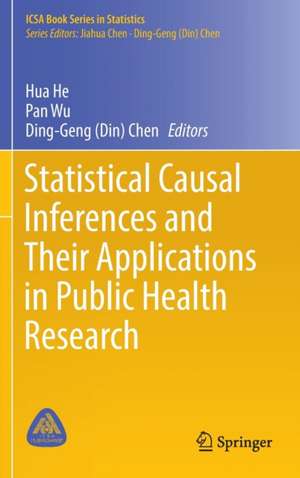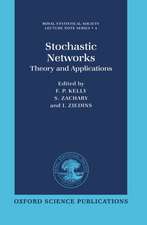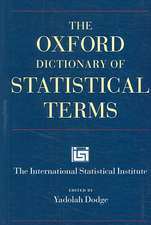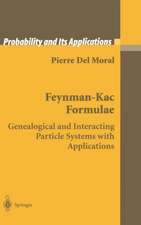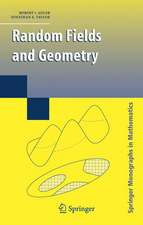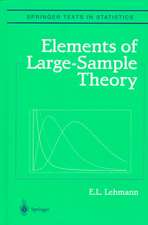Statistical Causal Inferences and Their Applications in Public Health Research: ICSA Book Series in Statistics
Editat de Hua He, Pan Wu, Ding-Geng (Din) Chenen Limba Engleză Hardback – 4 noi 2016
| Toate formatele și edițiile | Preț | Express |
|---|---|---|
| Paperback (1) | 642.51 lei 6-8 săpt. | |
| Springer International Publishing – 23 iun 2018 | 642.51 lei 6-8 săpt. | |
| Hardback (1) | 898.26 lei 6-8 săpt. | |
| Springer International Publishing – 4 noi 2016 | 898.26 lei 6-8 săpt. |
Din seria ICSA Book Series in Statistics
- 18%
 Preț: 961.86 lei
Preț: 961.86 lei - 18%
 Preț: 905.68 lei
Preț: 905.68 lei - 18%
 Preț: 963.91 lei
Preț: 963.91 lei - 24%
 Preț: 608.84 lei
Preț: 608.84 lei - 18%
 Preț: 947.35 lei
Preț: 947.35 lei - 18%
 Preț: 1390.11 lei
Preț: 1390.11 lei - 20%
 Preț: 574.08 lei
Preț: 574.08 lei - 24%
 Preț: 666.20 lei
Preț: 666.20 lei - 18%
 Preț: 730.97 lei
Preț: 730.97 lei - 18%
 Preț: 1130.45 lei
Preț: 1130.45 lei - 24%
 Preț: 603.00 lei
Preț: 603.00 lei - 15%
 Preț: 594.10 lei
Preț: 594.10 lei - 15%
 Preț: 653.00 lei
Preț: 653.00 lei - 15%
 Preț: 640.88 lei
Preț: 640.88 lei - 18%
 Preț: 1014.28 lei
Preț: 1014.28 lei - 15%
 Preț: 637.25 lei
Preț: 637.25 lei - 18%
 Preț: 896.08 lei
Preț: 896.08 lei - 18%
 Preț: 793.63 lei
Preț: 793.63 lei - 18%
 Preț: 730.97 lei
Preț: 730.97 lei - 18%
 Preț: 947.18 lei
Preț: 947.18 lei - 18%
 Preț: 1109.62 lei
Preț: 1109.62 lei - 18%
 Preț: 789.52 lei
Preț: 789.52 lei -
 Preț: 387.75 lei
Preț: 387.75 lei
Preț: 898.26 lei
Preț vechi: 1095.44 lei
-18% Nou
Puncte Express: 1347
Preț estimativ în valută:
171.88€ • 179.94$ • 142.22£
171.88€ • 179.94$ • 142.22£
Carte tipărită la comandă
Livrare economică 05-19 aprilie
Preluare comenzi: 021 569.72.76
Specificații
ISBN-13: 9783319412573
ISBN-10: 3319412574
Pagini: 320
Ilustrații: XV, 321 p. 24 illus., 11 illus. in color.
Dimensiuni: 155 x 235 x 27 mm
Greutate: 0.65 kg
Ediția:1st ed. 2016
Editura: Springer International Publishing
Colecția Springer
Seria ICSA Book Series in Statistics
Locul publicării:Cham, Switzerland
ISBN-10: 3319412574
Pagini: 320
Ilustrații: XV, 321 p. 24 illus., 11 illus. in color.
Dimensiuni: 155 x 235 x 27 mm
Greutate: 0.65 kg
Ediția:1st ed. 2016
Editura: Springer International Publishing
Colecția Springer
Seria ICSA Book Series in Statistics
Locul publicării:Cham, Switzerland
Cuprins
Part I. Overview.- 1. Causal Inference – A Statistical Paradigm for Inferring Causality.- Part II. Propensity Score Method for Causal Inference.- 2. Overview of Propensity Score Methods.- 3. Sufficient Covariate, Propensity Variable and Doubly Robust Estimation.- 4. A Robustness Index of Propensity Score Estimation to Uncontrolled Confounders.- 5. Missing Confounder Data in Propensity Score Methods for Causal Inference.- 6. Propensity Score Modeling & Evaluation.- 7. Overcoming the Computing Barriers in Statistical Causal Inference.- Part III. Causal Inference in Randomized Clinical Studies.- 8. Semiparametric Theory and Empirical Processes in Causal Inference.- 9. Structural Nested Models for Cluster-Randomized Trials.- 10. Causal Models for Randomized Trials with Continuous Compliance.- 11. Causal Ensembles for Evaluating the Effect of Delayed Switch to Second-line Antiretroviral Regimens.- 12. Structural Functional Response Models for Complex Intervention Trials.- Part IV. Structural Equation Models for Mediation Analysis.- 13.Identification of Causal Mediation Models with An Unobserved Pre-treatment Confounder.- 14. A Comparison of Potential Outcome Approaches for Assessing Causal Mediation.- 15. Causal Mediation Analysis Using Structure Equation Models.
Recenzii
“This is an excellent overview of statistical causal inferences and their applications in public health research. This book is strongly recommended to students in statistics, biostatistics, and computational biology as well as to researchers in public health and biomedical research.” (Hemang B. Panchal, Doody's Book Reviews, April, 2017)
Notă biografică
Hua He, Ph.D., is an Associate Professor in Biostatistics at the Department of Epidemiology at Tulane University School of Public Health and Tropical Medicine. Dr. He received her Ph.D in Statistics in 2007 from the Department of Biostatistics and Computational Biology at the University of Rochester, where she then worked as a faculty member until she moved to Tulane University in 2015. Dr. He has been focusing on methodological and collaborative research with investigators in the areas of behavioral and social sciences both within and outside of academic institutes. She is a highly experienced biostatistician with expertise in longitudinal data analysis, structural equation models, potential outcome based causal inference, distribution-free models, ROC analysis and their applications to observational studies, and randomized controlled trials across a range of disciplines, especially in the behavioral and social sciences. She has published a series of publications in peer-reviewed journals and has contributed several chapters to books. She also co-authored a graduate-level textbook, Applied Categorical and Count Data Analysis (Chapman & Hall/CRC). She is the recipient of an R01 study entitled “Moving beyond description: statistical and causal inference for social media data” and has served as a co-investigator for multiple studies funded by NIH, NIMH, NHLBI, etc.
Pan Wu, Ph.D., is a senior research biostatistician in the Value Institute at the Christiana Care Health System and a Research Assistant Professor in the Department of Medicine, the Sidney Kimmel Medical School at the Thomas Jefferson University. His research focuses on causal inference, mediation analysis, longitudinal data analysis with missing data, survival analysis, medical diagnosis, and high-dimensional variable selection and their applications in psychosocial, biomedical, and epidemiological studies. Dr. Wu has collaborated with a wide range of investigators on multiple research projects funded by NIH, NIMH, NHLBI, and AHRQ including mental health, cardiovascular disease, women’s health, and health optimization. He has published a series of important publications in development of new methodology in causal inference and applications in public health. One of the works on estimation of causal treatment effect for non-parametric statistics was published as a feature article in Statistics in Medicine in 2014. Dr. Wu got his Ph.D. in Statistics from the department of Biostatistics and Computational Biology at the University of Rochester in 2013.
Ding-Geng Chen, Ph.D., is an elected Fellow of American Statistical Association for his leadership and influential contributions in biopharmaceutical statistics research; for leadership and prominent research contributions in public health; for major contributions to biostatistical methodology; for excellence in teaching and mentoring; and for prodigious and significant service to the statistical profession. He is currently the Wallace Kuralt distinguished professor at the University of North Carolina at Chapel Hill. He was a professor at the University of Rochester and the Karl E. Peace endowed eminent scholar chair in biostatistics at Georgia Southern University. He is also a senior statistics consultant for biopharmaceuticals and government agencies with extensive expertise in clinical trial biostatistics and public health statistics. Professor Chen has more than 100 referred professional publications and has co-authored and co-edited seven books on clinical trial methodology, meta-analysis, and public health applications. He has been invited nationally and internationally to give speeches on his research.
Pan Wu, Ph.D., is a senior research biostatistician in the Value Institute at the Christiana Care Health System and a Research Assistant Professor in the Department of Medicine, the Sidney Kimmel Medical School at the Thomas Jefferson University. His research focuses on causal inference, mediation analysis, longitudinal data analysis with missing data, survival analysis, medical diagnosis, and high-dimensional variable selection and their applications in psychosocial, biomedical, and epidemiological studies. Dr. Wu has collaborated with a wide range of investigators on multiple research projects funded by NIH, NIMH, NHLBI, and AHRQ including mental health, cardiovascular disease, women’s health, and health optimization. He has published a series of important publications in development of new methodology in causal inference and applications in public health. One of the works on estimation of causal treatment effect for non-parametric statistics was published as a feature article in Statistics in Medicine in 2014. Dr. Wu got his Ph.D. in Statistics from the department of Biostatistics and Computational Biology at the University of Rochester in 2013.
Ding-Geng Chen, Ph.D., is an elected Fellow of American Statistical Association for his leadership and influential contributions in biopharmaceutical statistics research; for leadership and prominent research contributions in public health; for major contributions to biostatistical methodology; for excellence in teaching and mentoring; and for prodigious and significant service to the statistical profession. He is currently the Wallace Kuralt distinguished professor at the University of North Carolina at Chapel Hill. He was a professor at the University of Rochester and the Karl E. Peace endowed eminent scholar chair in biostatistics at Georgia Southern University. He is also a senior statistics consultant for biopharmaceuticals and government agencies with extensive expertise in clinical trial biostatistics and public health statistics. Professor Chen has more than 100 referred professional publications and has co-authored and co-edited seven books on clinical trial methodology, meta-analysis, and public health applications. He has been invited nationally and internationally to give speeches on his research.
Textul de pe ultima copertă
This book compiles and presents new developments in statistical causal inference. The accompanying data and computer programs are publicly available so readers may replicate the model development and data analysis presented in each chapter. In this way, methodology is taught so that readers may implement it directly. The book brings together experts engaged in causal inference research to present and discuss recent issues in causal inference methodological development. This is also a timely look at causal inference applied to scenarios that range from clinical trials to mediation and public health research more broadly. In an academic setting, this book will serve as a reference and guide to a course in causal inference at the graduate level (Master's or Doctorate). It is particularly relevant for students pursuing degrees in Statistics, Biostatistics and Computational Biology. Researchers and data analysts in public health and biomedical research will also find this book to be animportant reference.
Caracteristici
Includes software and data sets so readers may replicate analyses Contains much needed coverage of recent developments in causal inference Begins with an introduction to the concept of potential outcomes as applicable to causal inference concepts, models, and assumptions Includes supplementary material: sn.pub/extras
